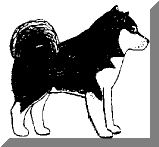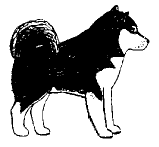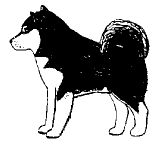|
the Alaskan malamute |
|
| History |
| The Alaskan Malamute was registered as a breed for the first time in 1935 thanks to the hard work of Mrs Eva B.
Seeley. Until that time the dogs were generally categorized under the umbrella of Inuit or Eskimo dogs. The particular dogs later to be become known
as Malamutes were associated with the Mahlemiut tribe of Inuit in the Western part of Alaska and had some distinguishing characteristics that set
them apart from other Inuit dogs. Following AKC recognition, in the 1940's and 50's the breed developed further through the efforts of other notable
enthusiasts including Ralph & Marcheta Schmidt and Robert Zoller. Today, most dogs in the breed can trace their roots back to the Kotzebue, M'Loot
and the blended Husky-Pak (incorporating a so-called "third strain" that comprised a very few dogs) lines represented by these three foundation
kennels. Only a very few have remained pure to any one particular foundation line. For more detailed information on the
history of the breed, please visit the AMCA website here:
 |
| Looks |
| The Alaskan Malamute is a beautiful dog. He is large, powerful and striking. The characteristic markings around the
head and over the body sets him apart from any other breed. Body colours can vary from pale silver through to black, pale copper through to a deep
mahogany red and also sable. Here are some of our dogs in a variety of colours:
|
| Character |
| Malamutes are often characterized with such terms as "independent", "stubborn", "hard to train" and "difficult". This
belies their true character, which is one of outstanding intelligence combined with a wicked sense of humour. They are amazingly fast at picking up
the idea of what it is you want them to do but, unless there is something in it for them, they can quickly lose interest once the novelty wears off
and they can appear not to have understood or to have forgotten what it was they were supposed to do. They also have the uncanny ability train their human
owners & carers into believing that it is easier to just "go with the flow" and give up with any form of more demanding training than the bare
essentials. However, with the right methods, lots of patience & an equally wicked sense of humour you can train a
Malamute to become a wonderful, entertaining & loving companion and, even, a "real" obedience dog, as well as an accomplished sledding dog and hiking
companion. |
| Temperament |
| The Malamute temperament is best understood when the harsh realities of life in the Arctic as a true working dog are
taken into account. The Malamute was treated more sociably by the Mahlemiut than some other Inuit dogs & this makes them more people-oriented and
cuddly than some other Northern breeds. However, they are also "survivors" and have a strong instinct for pack hierarchy & "chains of command" and
can be somewhat insecure & show undesirable behaviour/temperament if the pack order is not crystal clear in any given situation. They also have
a somewhat competitive/possessive nature when it comes to items which they consider to be of value, particularly food (which can be used to
advantage!). |
| So You Want a Puppy? |
| Malamutes are NOT for everyone. They have a rather distinct view on life that is very special. They can be both
endearing and incredibly frustrating at times. The following web page will help you decide if a Malamute is the right breed for you:
IS this the right breed for me? |
|
 NYRAKYM & SAMALJANKAN
NYRAKYM & SAMALJANKAN
